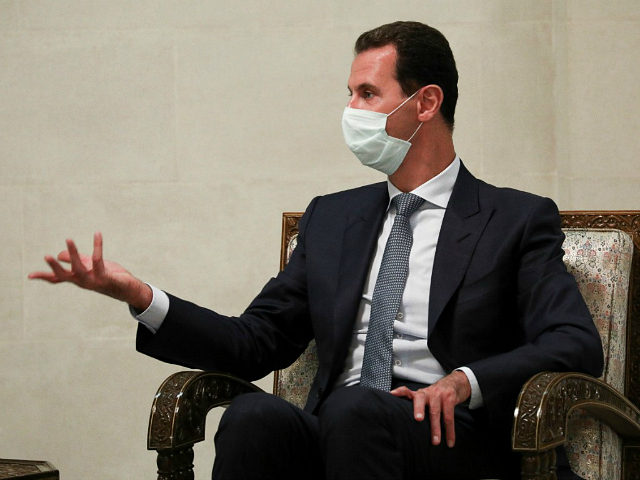Russian state media outlet Sputnik reported on Friday that the Syrian government is vocally denying reports, circulated in Mideast and Russian media, that Syrian dictator Bashar al-Assad had traveled to Moscow for treatment for a Chinese coronavirus infection.
The office of the Syrian “presidency” confirmed this week that Assad and wife Asma had both tested positive for Chinese coronavirus in Damascus, but claimed that both were experiencing mild symptoms and recovering at home. Bashar al-Assad is not publicly known to suffer from any medical conditions that may exacerbate coronavirus infection, but Asma al-Assad is known to have survived cancer, which often diminishes the vigor of a person’s immune system.
Sputnik reported on Friday morning that widespread reports suggested an emergency flight had left Damascus for Moscow, carrying Assad. The Assads are currently in quarantine and expected to be in isolation for at least two weeks, preventing them from making any public appearances. They have not issued any video or other proof of their presence in Moscow from within the presidential residence, however, to refute reports.
Assad’s envoy to Moscow, Riad Haddad, issued a statement denying the claim that Assad had left the country.
“These rumours are absolutely false. Mr. President is in Syria. Claims to the contrary are untrue,” Haddad told Sputnik.
The government of Russian President Vladimir Putin is Assad’s closest international ally, playing a pivotal role in the decade-long Syrian Civil War to keep him in power. The Kremlin made clear this week that it would be open to offering medical assistance to the Assads, including flying them to Moscow, if Damascus requested it.
“Russian specialists have huge experience of Covid [Chinese coronavirus] treatment, and I am sure that, should such requests come, the President will undoubtedly review them promptly,” Kremlin spokesman Dmitry Peskov told reporters on Tuesday. “However, I am unaware that anyone has contacted [Russia] so far.”
“Of course, we will hope that President Assad and his spouse will live through this disease in light form and acquire the necessary immunity,” Peskov added. The spokesman claimed that, to his knowledge, the Russian government is not involved in treating the Assads in Damascus.
Peskov’s reference to the “huge experience” of Russian doctors in treating the disease reflects Moscow’s failure in containing it. Russia has one of the largest rates of coronavirus infections and deaths in the world. As of Friday, the Putin regime has officially documented 4.3 million cases of Chinese coronavirus nationwide and nearly 90,000 deaths. International experts have questioned if these numbers properly reflect the extent of the infection rate in the country, noting that – like China, Iran, Cuba, Venezuela, and other rogue states – Russia’s metrics for identifying someone’s death as attributable to coronavirus were opaque and testing for the virus insufficiently widespread during the beginning of the pandemic. The Russian government proved skeptics correct in December, admitting that the nation’s true death toll was 186,000 people at the time, not the 55,265 on the record. Rosstat, the government statistics agency, did not specifically clarify what changed in the declaration of a coronavirus death to change the numbers and Russia apparently returned to its previous form of documenting deaths following Rosstat’s December statement, as the official number of deaths in the country in March is lower than the number in December.
Syria has documented a relatively low number of coronavirus infections in the population for its size. As of Friday, 16,257 Syrians have tested positive for coronavirus and over 1,000 people have died as a result of an infection, according to the Assad regime. Syria’s testing power and the reach of the Assad regime’s healthcare system are significantly limited, however, by the ongoing civil war. While Assad has largely eliminated Sunni Muslim rebel groups challenging his authority and American and Kurdish forces defeated the Islamic State “caliphate,” Assad still does not control much of the country. Some areas, like Rojava in northern Syria, are run by local Kurdish officials, and remain under regular assault by the Turkish military. Others have seen so much destruction during the war that they are largely uninhabitable. Damascus and Syria’s coastal areas have largely remained under Assad’s control for most of the civil war.
Assad’s office stated on Monday that the first couple would stay in isolation in Damascus for the foreseeable future and are expected to continue working.
“Bashar al-Assad and Mrs. Asma al-Assad are infected with the coronavirus, and they are in a good health and in a stable condition,” the statement read. “They will continue their work during their home quarantine period, which will last for two or three weeks.”
Follow Frances Martel on Facebook and Twitter.

COMMENTS
Please let us know if you're having issues with commenting.